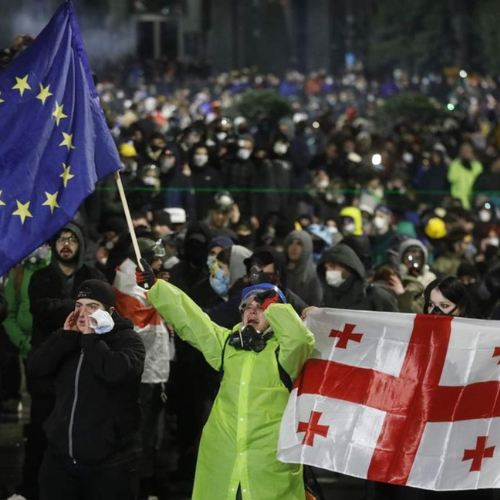On December 5, Ukraine’s President Volodymyr Zelensky imposed sanctions on several Georgian officials, accusing them of bringing Georgia closer to Russian control. Among those targeted is Bidzina Ivanishvili, a powerful oligarch with deep ties to Russia, who is seen as the de facto leader of the Georgian Dream party. The sanctions also affect Prime Minister Irakli Kobakhidze and 17 other individuals, including influential figures in Georgia’s media and security sectors.
Protests Sparked by Delayed EU Membership
The sanctions were announced during a time of growing unrest in Georgia. Protests erupted after Prime Minister Kobakhidze announced that Georgia’s European Union (EU) membership process would be delayed until at least 2028. Many Georgians saw this as a setback for the country’s aspirations to join the EU, which they view as vital for securing their political and economic future.
Georgia has long wanted to join the EU as part of its efforts to strengthen ties with Europe, distancing itself from Russian influence. However, Kobakhidze’s statement ignited anger across the country, with many fearing that the delay might signal a shift towards Moscow. Thousands of protesters gathered in Georgia’s capital, Tbilisi, and other cities, demanding that the government accelerate its EU membership process and align itself with the West instead of Russia.
The Georgian government’s response to the protests was swift and violent. Police clamped down on demonstrators, resulting in hundreds of arrests and injuries. Opposition leaders and journalists were among those targeted in the crackdown. The heavy-handed approach further fueled the anger of protesters and drew condemnation from international observers.
Georgian Crisis Deepens: Ukraine’s Reaction to EU Membership Delay
Ukraine’s Sanctions and Their Targets
In response to the violent suppression of protests, Ukraine announced sanctions on several high-ranking Georgian officials. These sanctions were aimed at individuals who are perceived as facilitating Russia’s growing influence in Georgia. Ivanishvili, the oligarch, was one of the most significant figures sanctioned. With his wealth and political influence, Ivanishvili is accused of using his power to push Georgia closer to Russia, despite the country’s aspirations to join the EU.
Also included on the sanctions list are Prime Minister Kobakhidze and other key members of the Georgian government, including the head of the State Security Service and the Interior Minister. Several media leaders were sanctioned as well, as the Georgian Dream party is known for its influence over the country’s press. These officials have been accused of undermining Georgia’s democracy and press freedom, aligning the country more closely with Moscow’s interests.
Zelensky’s announcement pointed to the growing concerns about Russian influence in the region, highlighting that such actions were detrimental to Georgia’s future. He warned that failing to take strong action now could cost countries like Georgia their freedom and independence, leaving them vulnerable to Russian control.
International Response and Growing Backlash
The move by Ukraine was followed by strong reactions from the international community. Lithuania, Latvia, and Estonia, all EU member states, announced that they would ban certain Georgian officials from entering their countries. These countries voiced their disapproval of the Georgian government’s crackdown on protests and its shift toward Russia. The European Union and the United States also condemned the government’s actions, calling for an end to the violence against protesters and urging the Georgian government to reassess its direction.
Georgia’s EU Hopes Crumble Amid Public Outcry
U.S. Secretary of State Antony Blinken joined the chorus of condemnation, warning that further sanctions could be imposed on Georgia if the situation did not improve. The U.S. has long been an ally of Georgia and has been supportive of its aspirations to join NATO and the EU. Blinken’s statement underscored the growing concern in Western nations about Georgia’s drift away from Europe and its increasing alignment with Russia.
Zelensky also appealed to European and American allies, urging them to stand united in support of Georgia, Moldova, and Ukraine. He emphasized that the security of these countries is vital to the stability of the region, warning that if they fall under Russian control, it would be a loss for all of Europe. Zelensky’s message came as part of a broader effort to unite the region against Russia’s expansionist ambitions.
Tensions in Georgia’s Political Landscape
The sanctions and the international backlash against the Georgian government reflect the deepening political crisis in Georgia. The ruling Georgian Dream party has faced criticism for undermining democratic principles and press freedom in the country. Many believe the government is pulling Georgia closer to Russia, which could result in the country’s loss of sovereignty and independence.
With protests continuing and international pressure mounting, Georgia’s political future remains uncertain. The government’s response to the protests and its political ties to Russia will likely shape the country’s path forward. The sanctions imposed by Ukraine are a direct response to these growing concerns, signaling that Ukraine is taking a strong stance in defense of its neighbors’ independence and aspirations for a European future.


